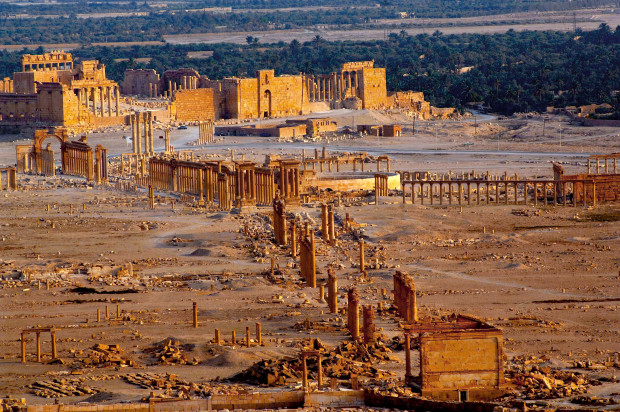Syria forces retake ancient Palmyra in major victory over ISIS

This undated photo released by the Syrian official news agency SANA, shows the site of the ancient city of Palmyra, Syria. Palmyra is an archaeological gem that Syrian troops took back from ISIS fighters on Sunday, March 27, 2016. AP
PALMYRA, Syria — Syrian troops recaptured the ancient city of Palmyra from the Islamic State of Iraq and Syria (ISIS) group on Sunday and pledged to build on the win with an advance against other jihadist strongholds.
President Bashar al-Assad hailed the victory as an “important achievement” as his Russian counterpart and key backer Vladimir Putin congratulated Damascus for retaking the UNESCO world heritage site.
An AFP correspondent inside Palmyra said monuments destroyed by the jihadists — like the iconic Temple of Bel — were in pieces but that much of the ancient city was intact.
READ: Palmyra’s most famed temple destroyed—UN | READ: ISIS setbacks in Syria and Iraq
Residential neighborhoods in the adjacent modern town were deserted and damage was widespread, the correspondent said.
Article continues after this advertisementA group of regime fighters took time off to celebrate their win and kicked around a football in the middle of a street strewn with debris.
Article continues after this advertisementThe jihadists sparked a global outcry after seizing Palmyra in May 2015 and setting about destroying some of its treasured monuments.
But Syria’s antiquities chief on Sunday said the city’s priceless artefacts were in much better shape than feared.
“We were expecting the worst. But the landscape, in general, is in good shape,” Maamoun Abdulkarim told AFP from Damascus.
“We could have completely lost Palmyra… The joy I feel is indescribable.”
The Syrian army said that Sunday’s victory meant the city would now serve as a base to “broaden operations” against ISIS, including in its stronghold of Raqa and Deir Ezzor further east.
Backed by a barrage of Russian air strikes, Syrian troops and allied militia launched a major offensive to retake Palmyra this month.
The city is both a symbolic and strategic prize for Assad’s forces, as it provides control of the surrounding desert extending all the way to the Iraqi border.
At least 400 ISIS fighters were killed in the battle for the city, the Syrian Observatory for Human Rights said. On the government side, 188 troops and militiamen were killed.
“That’s the heaviest losses that ISIS has sustained in a single battle since its creation” in 2013, the director of the Britain-based monitoring group, Rami Abdel Rahman, told AFP.
He said two cars packed with explosives blew up in the afternoon, one west of Palmyra and the other northeast of the city.
Jihadists under pressure
After seizing Palmyra last year, ISIS blew up two of the site’s treasured temples, its triumphal arch and a dozen tower tombs, in a campaign of destruction that UNESCO described as a war crime.
The jihadists used Palmyra’s ancient theatre as a venue for public executions and also murdered the city’s 82-year-old former antiquities chief.
A military source told AFP on Sunday that ISIS militants had retreated towards the east as the army made its final push.
Army sappers defused roadside mines in both the modern part of the city and in the old ruins.
Syrian state television broadcast footage from inside Palmyra’s famed museum, showing jagged pieces of sculptures on the ground and blanketed in dust.
ISIS, behind a string of attacks in the West including last week’s Brussels bombings, is under growing pressure from Syrian and Iraqi forces determined to retake bastions of its self-proclaimed “caliphate”.
On Thursday, the Iraqi army announced the launch of an offensive to eventually recapture second city Mosul, held by the jihadists since June 2014.
United Nations chief Ban Ki-moon told reporters in neighboring Jordan that he was “encouraged” by the recapture of Palmyra.
Palmyra ‘will return’
Russian forces, which intervened in support of longtime ally Assad last September, were heavily involved in the Palmyra offensive despite a major drawdown last week.
Russian warplanes carried out 40 combat sorties around Palmyra in the last 24 hours, striking 117 “terrorist targets” and killing 80 ISIS fighters, Moscow’s defense ministry said Sunday.
Putin telephoned Assad to congratulate the Syrian leader, adding that “successes such as the liberation of Palmyra would be impossible without Russia’s support,” a Kremlin spokesman said.
Assad said the victory was “fresh proof of the efficiency of the Syrian army and its allies in fighting terrorism”.
ISIS and its jihadist rival, the Al-Qaeda-affiliated Al-Nusra Front, are not party to a landmark ceasefire in Syria since February 27.
The month-long truce has brought relative quiet to many areas across Syria, where more than 270,000 have been killed and millions had fled their homes in the last five years.
The Observatory said on Sunday that 363 civilians had been killed since the truce went into effect — the lowest monthly toll in four years.
The number represented a major drop from the previous month, when more than 1,100 civilians, including 234 children, were killed.
Palmyra, northeast of Damascus, drew some 150,000 tourists a year before Syria’s civil war and is known to Syrians as the “Pearl of the Desert”.
Syrian officials, including antiquities chief Abdulkarim, have vowed to rebuild the ancient monuments.
“Palmyra will return to the way it was,” he said.